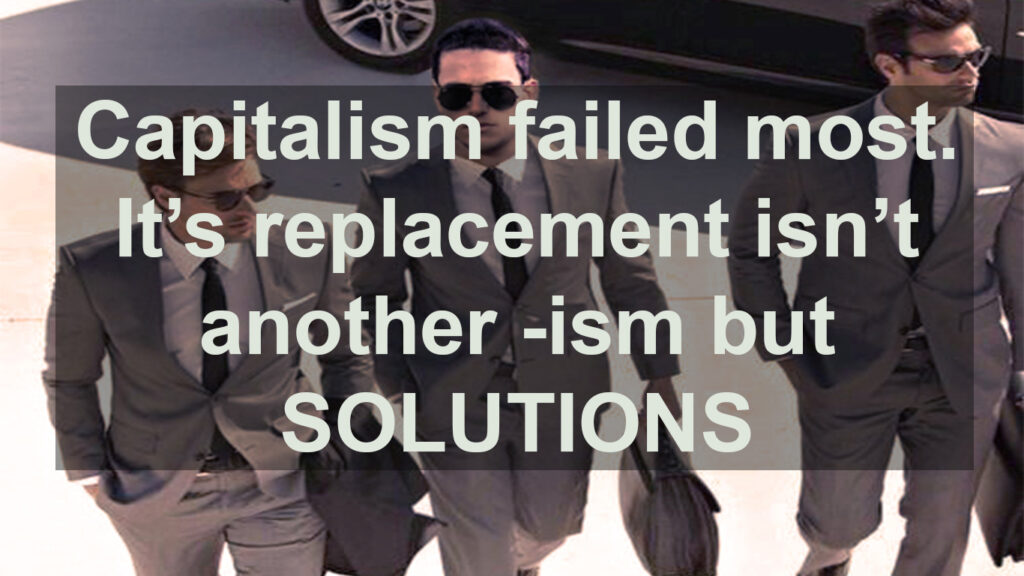As a former owner of a successful software company who made his income by selling to capitalist corporations, most of the crony capitalism type, understanding why this economic structure is fatal to most came easy. Being brave enough to articulate that reality was less straightforward because of my former indoctrination and that of those who surrounded me.
I alluded to my naivete in my book “As I See It: Class Warfare The Only Resort To Right Wing Doom” when taking my economic class supply-and-demand coupled with greed even absent scarcity befuddled me.
This morning I read a great article in the Guardian by George Monbiot titled “Dare to declare capitalism dead – before it takes us all down with it.” It is one of the better articles that I have read on why Capitalism must end sooner rather than later.
Monbiot first shows the tension within he felt when the truth hit him. He wrote the following.
For most of my adult life I’ve railed against “corporate capitalism”, “consumer capitalism” and “crony capitalism”. It took me a long time to see that the problem is not the adjective but the noun. While some people have rejected capitalism gladly and swiftly, I’ve done so slowly and reluctantly.
But it is a subsequent paragraph that I believe will make it easier for others to come to the correct realization of the fatality of capitalism without fearing some negative label.
As I’ve grown older, I’ve come to recognise two things. First, that it is the system, rather than any variant of the system, that drives us inexorably towards disaster. Second, that you do not have to produce a definitive alternative to say that capitalism is failing. The statement stands in its own right. But it also demands another, and different, effort to develop a new system.
Monbiot recognizes the poison that drives capitalism and its effects.
Capitalism’s failures arise from two of its defining elements. The first is perpetual growth. Economic growth is the aggregate effect of the quest to accumulate capital and extract profit. Capitalism collapses without growth, yet perpetual growth on a finite planet leads inexorably to environmental calamity. …
A system based on perpetual growth cannot function without peripheries and externalities. There must always be an extraction zone – from which materials are taken without full payment – and a disposal zone, where costs are dumped in the form of waste and pollution. As the scale of economic activity increases until capitalism affects everything, from the atmosphere to the deep ocean floor, the entire planet becomes a sacrifice zone: we all inhabit the periphery of the profit-making machine.
But most importantly he identifies the intrinsic immorality that is integral to the system. It is
The bizarre assumption that a person is entitled to as great a share of the world’s natural wealth as their money can buy. This seizure of common goods causes three further dislocations. First, the scramble for exclusive control of non-reproducible assets, which implies either violence or legislative truncations of other people’s rights. Second, the immiseration of other people by an economy based on looting across both space and time. Third, the translation of economic power into political power, as control over essential resources leads to control over the social relations that surround them.
Monbiot will go on to say that many would attack because they make the claim that capitalism has brought many out of poverty. But one must place that statement in context as he eloquently points out.
It is true that capitalism, and the economic growth it drives, has radically improved the prosperity of vast numbers of people, while simultaneously destroying the prosperity of many others: those whose land, labour and resources were seized to fuel growth elsewhere. Much of the wealth of the rich nations was – and is – built on slavery and colonial expropriation.
Like coal, capitalism has brought many benefits. But, like coal, it now causes more harm than good. Just as we have found means of generating useful energy that are better and less damaging than coal, so we need to find means of generating human wellbeing that are better and less damaging than capitalism.
The following is the message those of us who know capitalism is destroying us but understand that most Americans are made to fear its alternative must be fluent and ready to explain.
There is no going back: the alternative to capitalism is neither feudalism nor state communism. Soviet communism had more in common with capitalism than the advocates of either system would care to admit. Both systems are (or were) obsessed with generating economic growth. Both are willing to inflict astonishing levels of harm in pursuit of this and other ends. Both promised a future in which we would need to work for only a few hours a week, but instead demand endless, brutal labour. Both are dehumanising. Both are absolutist, insisting that theirs and theirs alone is the one true God.
Recently Princeton Professor Eddie Galude Jr. did a masterful job in pointing out the problem with capitalism in a manner most could understand. Given the country’s level of indoctrination into believing that our system is divine or the only way, we must use examples, proof, and easy to understand analysis ad nauseam. Absent our success, welcome to the permanent state of indentured servitude. Most importantly, going forward, instead of always identifying some replacement “-ism,” maybe it is time that we simply speak solutions.

